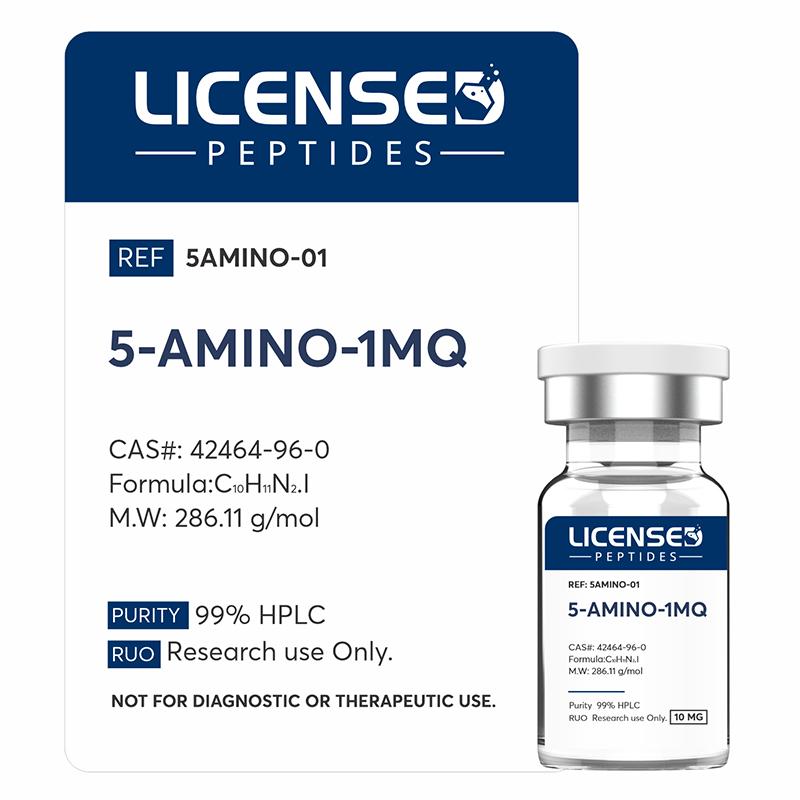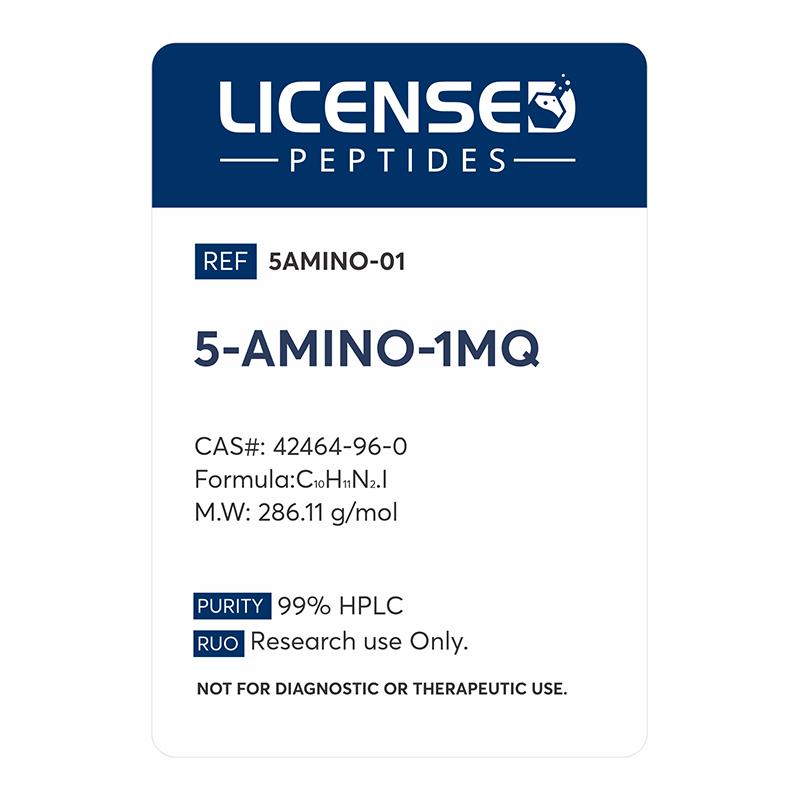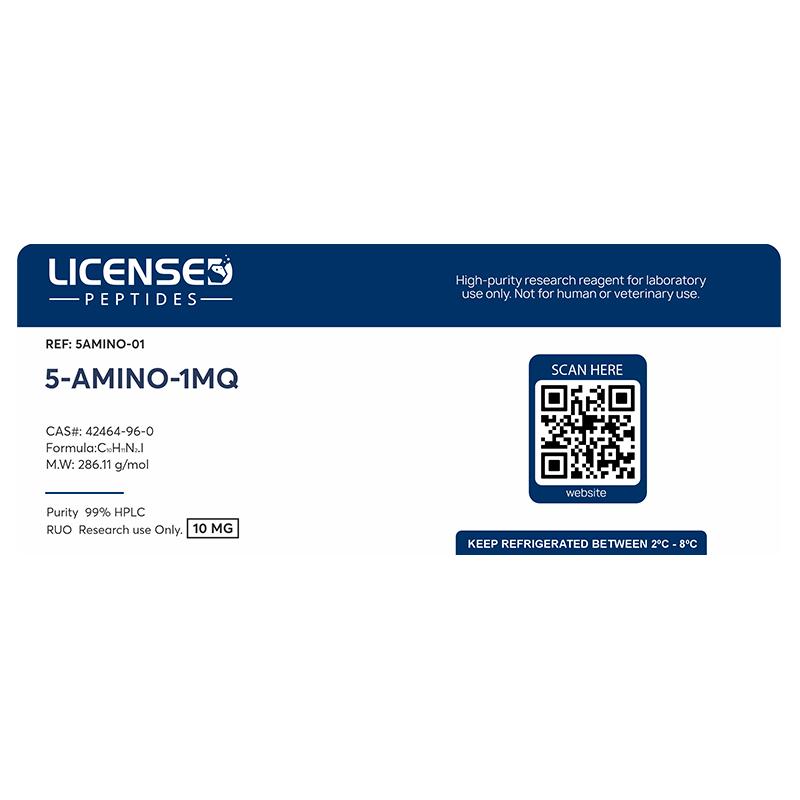5-Amino-1MQ 10mg
$69.99
5-amino-1MQ is a small molecule that inhibits the enzyme nicotinamide N-methyltransferase (NNMT), which plays a key role in metabolism and energy regulation, particularly in fat tissue. By blocking NNMT, 5-amino-1MQ increases levels of nicotinamide adenine dinucleotide (NAD⁺), a critical cofactor in cellular metabolism. This increase in NAD⁺ enhances metabolic activity and activates the SIRT1 gene, also known as the “longevity gene.”
SIRT1 is associated with a reduced risk of various chronic conditions, including diabetes, obesity, metabolic syndrome, cardiovascular disease, kidney and liver disorders, neurodegenerative diseases, and certain cancers. In studies involving mice, treatment with 5-amino-1MQ led to a 7% reduction in body mass within 10 days, without any change in food consumption compared to untreated controls. Additional research suggests that lowering NNMT activity may help shrink fat cells and decrease fat accumulation.
$69.99
$69.99
Peptide Capsules
Purchase Peptides
Purchase Blends
Overview
5-amino-1MQ (5-amino-1-methylquinolinium), a methylquinolinium analogue, is a small peptide inhibitor of the cytosolic enzyme nicotinamide N-methyltransferase (NNMT). NNMT has been associated with obesity and type 2 diabetes and plays an important role in regulating cellular energy homeostasis. Inhibiting NNMT with 5-amino-1MQ has been shown to promote significant weight loss, reduce fat mass and adipocyte size, and lower plasma cholesterol and glucose levels. Methylquinolinium derivatives like 5-amino-1MQ are currently being studied as potential therapies for obesity and diabetes. Additionally, NNMT inhibition may activate stem cells and enhance the regenerative capacity of skeletal muscle.
5-Amino-1 MQ: Structure
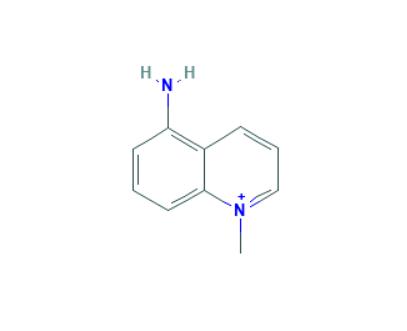
Molecular Formula: C₁₀H₁₁N₂
Molecular Weight: 159.21 g/mol
PubChem CID: 950107
CAS Number: 42464-96-0
Synonyms: 5-amino-1-methylquinolinium
Source: PubChem
5-AMINO – 1MQ: Research
Obesity
Nicotinamide-N-methyltransferase (NNMT) has emerged as a novel therapeutic target in adipose tissue for the treatment of obesity and type 2 diabetes (T2D). NNMT is a cytosolic enzyme that plays a key role in regulating cellular energy homeostasis by influencing both nicotinamide (NA) metabolism within the NAD⁺ salvage pathway and S-(5′-adenosyl)-L-methionine (SAM) flux within the methionine cycle. Studies have shown that NNMT expression is elevated in the white adipose tissue (WAT) of obese and diabetic mice, with significantly higher activity compared to its levels in brown adipose tissue, liver, and lungs of diet-induced obese mice. Plasma concentrations of the NNMT product 1-methylnicotinamide (1-MNA) have been found to correlate with adipose NNMT expression, body mass index (BMI), and waist circumference, supporting the clinical relevance of this target. Notably, high-fat diet-fed mice treated with antisense oligonucleotides (ASOs) that reduced NNMT expression in adipose tissue were protected from diet-induced obesity and showed lower adiposity compared to control animals.
Through structure-guided design and binding studies, potent small-molecule NNMT inhibitors based on a methylquinolinium (MQ) scaffold have recently been developed. The present study builds on these findings by demonstrating that these NNMT inhibitors are highly membrane-permeable and selective, effectively lowering intracellular 1-MNA levels and inhibiting lipogenesis in vitro. Encouraged by these properties, a proof-of-concept in vivo study was conducted in diet-induced obese mice, showing that systemic administration of the most potent inhibitor reversed obesity by significantly reducing body weight and adiposity, without observable adverse effects.
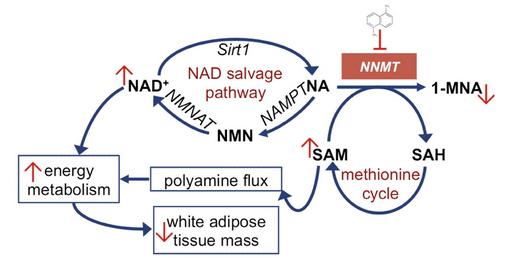
Improved Metabolic and Liver Health
A longer study (28-day dosing) demonstrated that 5-amino-1-MQ:
- Dose-dependently limited body weight and fat gain
- Improved glucose tolerance and insulin sensitivity, reducing hyperinsulinemia
- Ameliorated hepatic steatosis, reduced liver weight/size, decreased triglycerides
- Normalized markers like ALT, AST, and ketone bodies
5-Amino – 1MQ : Scientific Journal & Authors
JoAnne J. Babula, PhD, is a biomedical scientist specializing in metabolic disease and drug discovery. Her research focuses on nicotinamide N-methyltransferase (NNMT) inhibition, where she has demonstrated that small-molecule inhibitors such as the methylquinolinium derivative 5-amino-1MQ can reduce adiposity, improve glucose tolerance, and restore liver health in obese models, supporting their potential as novel therapeutics for obesity and type 2 diabetes.
Referenced Citations
ALL ARTICLES AND PRODUCT INFORMATION PROVIDED ON THIS WEBSITE ARE FOR INFORMATIONAL AND EDUCATIONAL PURPOSES ONLY.
The products available on this website are intended solely for in-vitro research purposes (Latin: “in glass”), meaning they are used in experiments conducted outside a living organism. These products are not medicines or drugs, have not been evaluated or approved by the U.S. Food and Drug Administration (FDA), and are not intended to diagnose, treat, cure, or prevent any disease or medical condition. Any administration to humans or animals, whether by ingestion, injection, or other means, is strictly prohibited by law.
Test
Storage Instructions:
All of our products are manufactured using the Lyophilization (Freeze Drying) process, which ensures that our products remain 100% stable for shipping for up to 3-4 months.
Once the peptides are reconstituted (mixed with bacteriostatic water), they must be stored in the fridge to maintain stability. After reconstitution, the peptides will remain stable for up to 30 days.
Lyophilization is a unique dehydration process, also known as cryodesiccation, where the peptides are frozen and then subjected to low pressure. This causes the water in the peptide vial to sublimate directly from solid to gas, leaving behind a stable, crystalline white structure known as lyophilized peptide. The puffy white powder can be stored at room temperature until you’re ready to reconstitute it with bacteriostatic water.
Once peptides have been received, it is imperative that they are kept cold and away from light. If the peptides will be used immediately, or in the next several days, weeks or months, short-term refrigeration under 4C (39F) is generally acceptable. Lyophilized peptides are usually stable at room temperatures for several weeks or more, so if they will be utilized within weeks or months such storage is typically adequate.
However, for longer term storage (several months to years) it is more preferable to store peptides in a freezer at -80C (-112F). When storing peptides for months or even years, freezing is optimal in order to preserve the peptide’s stability.
For further information on proper storage techniques, click the link below:
